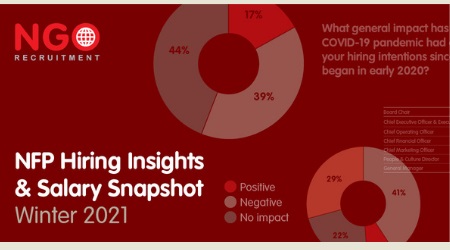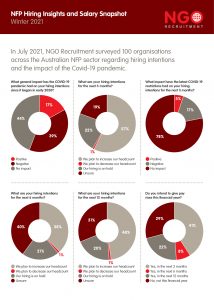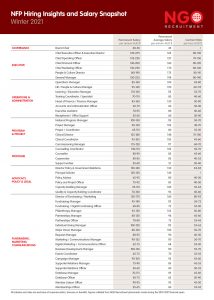
Australian Not-For-Profit (NFP) sector rising to the Covid-19 challenge.
Australian NFP hiring intentions remain strong during the ongoing Covid-19 pandemic, the latest NGO Recruitment Hiring Insights and Salary Snapshot shows. With new lockdowns in place across several states, in July 2021, NGO Recruitment surveyed 100 Australian NFPs to assess the impact of the global pandemic on hiring intentions over the last 18 months and into the new financial year FY21/22.
The findings were encouraging, with 44% of those NFPs surveyed stating the COVID-19 pandemic has had no impact on hiring intentions since early 2020, with 17% stating the pandemic has even had a positive impact.
Interestingly, Australia’s current wave of public health order restrictions has minimal impact on hiring intentions, with 78% experiencing no repercussions so far. 57% of those surveyed intend to increase headcount in the next three months with 41% planning to give salary increases during the same period.
“In the last 18 months, Australia’s NFP sector has adjusted to our new way of working. And while there’s still uncertainty in subsectors such as education where recruitment is still dependent on the opening of international borders, the majority of NFPs are experiencing minimal, or in some cases positive, repercussions from the pandemic,” says Richard Green, Managing Director, NGO Recruitment.
“NFP hiring managers are now comfortable recruiting in lockdowns, and employees are used to working productively from home and remaining connected with their colleagues remotely,” he adds.

Top roles in demand
Of the top roles most in demand in the next three months, just over a quarter (26%) of those NFPs surveyed stated fundraising, marketing, communications and events would be their top priority, with 23% recruiting counselling, casework and frontline roles and 21% focused first and foremost on program and project management roles.
These findings match NGO Recruitment’s recent experience of NFP labour demand with fundraising professionals, frontline workers and project management skills highly sought after. The community legal sector is also experiencing a considerable shortage of lawyers and support roles.
“Face-to-face fundraising became impossible with the onset of Covid-19, so we saw a necessary shift towards digital and data-driven strategies. This is now a primary focus for NFPs looking to pandemic-proof essential revenue streams so we’re experiencing extremely high demand for digital fundraisers and database managers. In many cases, NFPs have to look beyond the sector for these highly transferrable skills,” says Richard.
In addition, the pandemic has taken a significant toll on people’s mental health and demand for counselling support, community housing services, homelessness organisations and other related service providers has soared. As a result, many of these NFPs have received extra funding to meet the increased level of demand for these specialist frontline services.
“Sadly, this is not positive growth, and we’re now seeing a huge demand for clinical directors, clinical team leaders, clinical coordinators and support workers. Counsellors are also in high demand from NFPs such as the Blue Knot Foundation.”Demand for assistance with specific legal issues has also increased significantly since the pandemic in areas such as domestic and family violence, social security, employment and tenancy. But the community legal sector is also struggling to find lawyers and support staff.
“It’s proving very hard to recruit lawyers who want to work in the community legal sector largely due to the relatively low salaries on offer compared to commercial law firms. Demand is particularly high in regional Australia but it can take months to fill these roles.”
Salaries
41% of those NFPs surveyed intend to give salary increases within the next three months, however, almost a third (29%) of those surveyed are not planning to give raises at all this financial year. In general salaries in the NFP sector have remained relatively stable over the last 12-24 months reflecting wider national remuneration trends.
“Salaries in the NFP sector are mirroring what’s happening in the broader economy. Although we see spikes in very hard to find roles, particularly at the executive end of the labour market, salaries have remained steady for several years and will continue to remain so.”
Outlook
According to our NFP Hiring Insights and Salary Snapshot, the majority of NFPs surveyed intend to hire in the next three to six months, demonstrating the sector’s resilience and ability to respond effectively in times of crisis. With increases in funding for frontline services, NFPs continue to drive essential program delivery and play a vital role in our communities.

